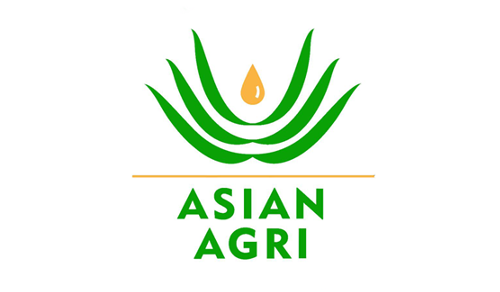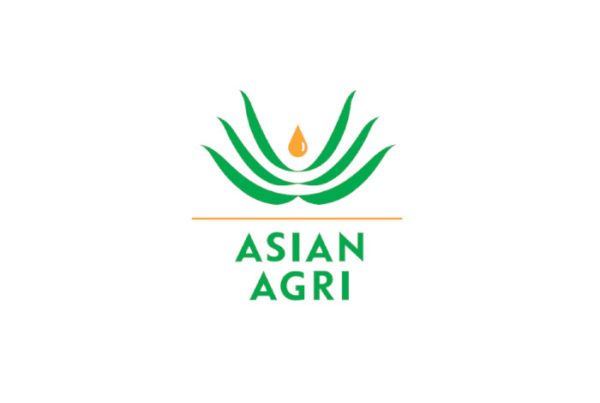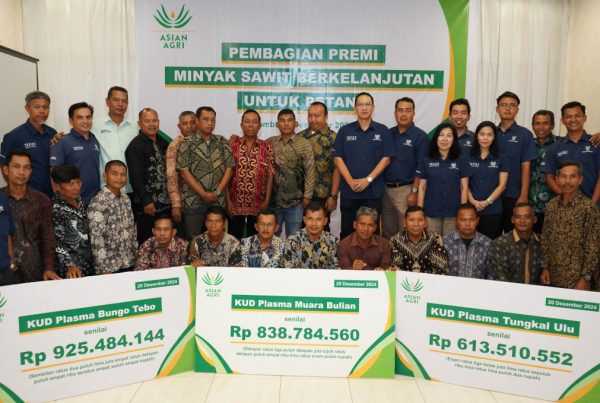Pekanbaru, 12 July 2017 – In support of the government program to develop national food independence and improve smallholders’ welfare, Asian Agri is expanding its partnership program through One to One Partnership Commitment.
Focusing in improving productivity and empowering smallholders, Asian Agri is targeting to manage 100,000 hectares of smallholder oil palm plantations by 2018.
Oil palm smallholders have an important role in supporting sustainable practices in managing national oil palm plantations. However, they have to overcome many limitations such as non-awareness of best management practices and zero burning policy, as well as seed choosing and its treatment, and also the waste usage to be used as a fertilizer and as a raw material for renewable energy production.
Asian Agri’s Riau Regional Head Omri Samosir said, “This partnership is beneficial to smallholders and adapts to their socio-economic and cultural circumstances. The program also aims to support our journey to national food independence by empowering smallholders with sustainable practices.”
Given the success of the plasma partnership program launched in 1987, Asian Agri has reached out to more partners including independent smallholders who joined in 2012. Today, Asian Agri manages 100,000 hectares of company-owned plantations, and partners with plasma smallholders who manage 60,000 hectares as well as independent smallholders with 25,000 hectares of oil palm plantations in North Sumatra, Riau, and Jambi.
As one of the provinces that became one of the largest producers of oil palm in Indonesia, Riau demonstrates the important role of national smallholders in supporting the sustainable practices. According to Indonesia Plantation Statistic (Statistik Perkebunan Indonesia) 2014 – 2016 by Directorate General of Plantation, smallholders manage about 1.4 million hectares out of the available 2.5 million hectares in Indonesia. About 932,000 are managed by private companies while the rest is owned by the national government. Producing about 3.6 million MT of palm oil each year, private companies’ plantations yield nearly twice the productivity of smallholder plantations which produce about 3.8 million MT of palm oil. This shows that smallholders’ plantations have a big potential to increase their productivity if operations are more sustainable and plantation management, more efficient.
Pengarapen Gurusinga, Head of Partnership said that improving smallholder productivity is a key focus for Asian Agri. “Before joining the partnership program, the relationship between AA and the independent smallholders is about purchasing Fresh Fruit Bunches. Now that they are part of our family, we want them to succeed even more and have more yield for their land.”
Plasma Smallholders Success
AA’s partnership with plasma smallholders is nurtured even at the early stages. During the land clearance stage, AA provides access to the best seeds, develops the plantation scheme, and facilitates funding of operations by third parties. Members of AA’s Research & Development teams have developed one of the best oil palm seeds in the industry. This Topaz seed has been shown to improve smallholder productivity by yielding about 18 – 22 tons of FFB per hectare.
Today, most plantations have entered the second phase since the first seed was planted over 30 years ago. A significant number of plantations have started to be replanted. It is at this time, too, when smallholders have to decide whether to continue the partnership with companies such as AA or sign their contract with another party. In April 2016, the Indonesian government supported this process by giving replanting fund assistance to 135 smallholders from the Mulus Rahayu Cooperative, a key partner of Asian Agri.
“We are grateful that our smallholders have chosen to continue their long-term partnership with us. Their participation in our replanting program is an affirmation of trust that we have built over the last 20 to 25 years. We will continue to build upon this trust and ensure that we share best practices that improve their yield, ensuring their operations become more productive and sustainable,” said Gurusinga.
Empowerment of Independent Smallholders
Apart from plasma smallholders, Asian Agri has also reached out to independent smallholders. In 2012, it formed a partnership programme with independent smallholders.
“We began by simplifying our smallholder supply chain by giving independent smallholders access to sell FFBs directly to the company. By eliminating intermediaries, smallholders were able to get a better price for their products,” said Gurusinga.
Asian Agri also educated smallholders with best practices as well as provided them with loans to finance operational costs. Soft loans were also used to improve road access, reducing delivery time of FFBs to the mills.
In the second quarter of 2017, Amanah – one of AA’s first independent smallholder partners, was one of the first smallholders association to be certified by the Indonesian Sustainable Palm Oil (ISPO).
In One to One Partnership Commitment, Asian Agri adapts the same partnership scheme to be implemented to the national independent smallholders, to improve smallholders welfare through production improvement and smallholders income that higher than another oil palm smallholders in general.
“We are targeting to increase our independent smallholder-owned plantation from 25,000 hectares to 40,000 hectares by 2018. This will fulfill our One to One Partnership Commitment where 1 hectare of AA-owned plantation is paired with 1 hectare of plasma-/independent-smallholder-owned plantation,” said Gurusinga.
***
About Asian Agri:
Asian Agri is one of the leading private companies in Indonesia producing crude palm oil (CPO) since 1979 and employs around 25,000 people today. Since 1987, Asian Agri has been a pioneer of the Indonesian government’s Trans-National Government Migration (PIR-Trans) program. Today, the company manages 100,000 Ha of land and partners 30,000 smallholder families in Riau and Jambi who operate 60,000 Ha of palm oil plantation.
Asian Agri’s success in becoming one of the leading CPO companies has been acknowledged internationally with the ISO 14001 certification for all of its operations. Its Learning Institute in Pelalawan, Riau, as well as its nursery research center in Kampar, Riau are ISO 9001 certified. In addition, Asian Agri’s R&D Center in Tebing Tinggi has also obtained certification by the International Plant-Analytical Exchange at the WEPAL lab at Wageningen University in The Netherlands, for its high standards.
More than 86% of both owned plantations in North Sumatra, Riau & Jambi provinces & scheme smallholder plantations in Riau & Jambi provinces have been RSPO certified.
All plantations have also been ISCC-certified (International Sustainability & Carbon Certification), including plantation owned by smallholders. Palm oil mills and plantation in Buatan, Ukui, Soga, Tungkul Ulu, and Muara Bulian have been ISPO (Indonesian Sustainable Palm Oil) certified.
For further information, please contact:
| Lidya Veronica |
| Corporate Communications |
| E-mail: Lidya_Veronica@www.asianagri.com |
| DID: +62 8126026460 |





